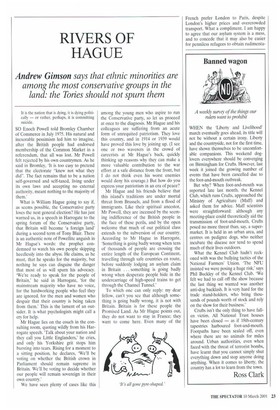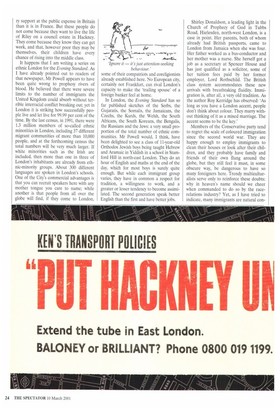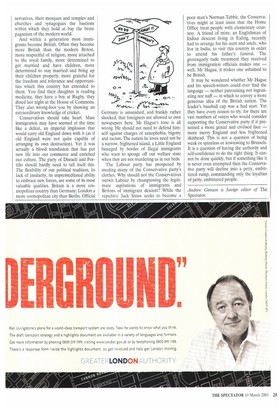RIVERS OF HAGUE
Andrew Gimson says that ethnic minorities are
among the most conservative groups in the land: the Tories should not spurn them
It is the nation that is dying, it is dying politically — or rather, perhaps, it is committing suicide.
SO Enoch Powell told Bromley Chamber of Commerce in July 1975. His natural and inexorable pessimism led him to imagine, after the British people had endorsed membership of the Common Market in a referendum, that all was lost. Mr Powell felt rejected by his own countrymen. As he said in Bromley, 'It is too easy to pretend that the electorate "knew not what they did". The fact remains that to be a nation self-governed and self-taxed, living under its own laws and accepting no external authority, meant nothing to the majority of them.'
What is William Hague going to say if, as seems possible, the Conservative party loses the next general election? He has just warned us, in a speech in Harrogate to the spring forum of the Conservative party, that Britain will become 'a foreign land' during a second term of Tony Blair. There is an authentic note of Powellite anguish in Mr Hague's words: the prophet condemned to watch his own people skipping heedlessly into the abyss. He claims, as he must, that he speaks for the majority, but nothing he says can disguise the danger that most of us will spurn his advocacy. 'We're ready to speak for the people of Britain,' he said in Harrogate, 'for the mainstream majority who have no voice, for the hardworking people who feel they are ignored, for the men and women who despair that their country is being taken from them.' This is the lament of an outsider. It is what psychologists might call a cry for help.
Mr Hague lies on the couch in the consulting room, quoting wildly from his Harrogate speech. 'Talk about your nation and they call you Little Englanders,' he cries, and only his Yorkshire grit stops him bursting into tears. Rising for a moment to a sitting position, he declares, 'We'll be voting on whether the British crown in Parliament should remain supreme in Britain. We'll be voting to decide whether our people will remain sovereign in their own country.'
We have seen plenty of cases like this among the young men who aspire to run the Conservative party, so let us proceed at once to the diagnosis. Mr Hague and his colleagues are suffering from an acute form of unrequited patriotism. They love this country, and in 1914 or 1939 would have proved this love by joining up. (I see one or two waverers in the crowd of careerists at Mr Hague's back, quickly thinking up reasons why they can make a more valuable contribution to the war effort at a safe distance from the front, but I do not think even his worst enemies would deny his courage.) But how do you express your patriotism in an era of peace?
Mr Hague and his friends believe that this island's traditions are under mortal threat from Brussels, and from a flood of immigrants. Like their spiritual ancestor, Mr Powell, they are incensed by the seeming indifference of the British people in the face of these perils, and by the open welcome that much of our political class extends to the subversion of our country. According to Mr Hague in Harrogate, 'Something is going badly wrong when tens of thousands of people are crossing the entire length of the European Continent, travelling through safe countries en route, before suddenly lodging an asylum claim in Britain . . something is going badly wrong when desperate people hide in the undercarriage of high-speed trains to get through the Channel Tunnel.'
To which one can only reply: my dear fellow, can't you see that although something is going badly wrong, it is not with Britain. Britain is for these people the Promised Land. As Mr Hague points out, they do not want to stay in France; they want to come here. Even many of the
French prefer London to Paris, despite London's higher prices and overcrowded transport. What a compliment. I am happy to agree that our asylum system is a mess, and to concede that it may also be easier for penniless refugees to obtain rudimenta ry support at the public expense in Britain than it is in France. But these people do not come because they want to live the life of Riley on a council estate in Hackney. They come because they know they can get work, and that, however poor they may be themselves, their children have every chance of rising into the middle class.
It happens that I am writing a series on ethnic London for the Evening Standard. As I have already pointed out to readers of that newspaper, Mr Powell appears to have been quite wrong to prophesy rivers of blood. He believed that there were severe limits to the number of immigrants the United Kingdom could absorb without terrible interracial conflict breaking out; yet in London it is striking how successfully people live and let live for 99.99 per cent of the time. By the last census, in 1991, there were 1.3 million members of so-called ethnic minorities in London, including 37 different migrant communities of more than 10,000 people, and at the forthcoming census the total numbers will be very much larger. If white minorities such as the Irish are included, then more than one in three of London's inhabitants are already from ethnic-minority groups. About 300 different languages are spoken in London's schools. One of the City's commercial advantages is that you can recruit speakers here with any mother tongue you care to name; while another is that people from all over the globe will find, if they come to London, 'Ignore it — it's just attention-seeking behaviour.'
some of their compatriots and coreligionists already established here. No European city, certainly not Frankfurt, can rival London's capacity to make the 'trailing spouse' of a foreign banker feel at home.
In London, the Evening Standard has so far published sketches of the Serbs, the Gujaratis, the Somalis, the Jamaicans, the Czechs, the Kurds, the Welsh, the South Africans, the South Koreans, the Bengalis, the Russians and the Jews: a very small proportion of the total number of ethnic communities. Mr Powell would, I think, have been delighted to see a class of 11-year-old Orthodox Jewish boys being taught Hebrew and Aramaic in Yiddish in a school in Stamford Hill in north-east London. They do an hour of English and maths at the end of the day, which for most boys is surely quite enough. But while each immigrant group varies, they have in common a respect for tradition, a willingness to work, and a greater or lesser tendency to become assimilated. The second generation speak better English than the first and have better jobs.
Shirley Donaldson, a leading light in the Church of Prophecy of God in Tubbs Road, Harlesden, north-west London, is a case in point. Her parents, both of whom already had British passports, came to London from Jamaica when she was four. Her father worked as a bus-conductor and her mother was a nurse. She herself got a job as a secretary at Spencer House and has just qualified as a solicitor, some of her tuition fees paid by her former employer, Lord Rothschild. The British class system accommodates these new arrivals with breathtaking fluidity. Immigration is, after all, a very old tradition. As the author Roy Kerridge has observed: 'As long as you have a London accent, people don't think about colour. They marry without thinking of it as a mixed marriage. The accent seems to be the key.'
Members of the Conservative party tend to regret the scale of coloured immigration since the second world war. They are happy enough to employ immigrants to clean their houses or look after their children, and they probably have family and friends of their own flung around the globe, but they still feel it must, in some obscure way, be dangerous to have so many foreigners here. Trendy multiculturalists serve only to reinforce these doubts: why in heaven's name should we cheer when commanded to do so by the racerelations industry? Yet, as I have tried to indicate, many immigrants are natural con servatives, their mosques and temples and churches and synagogues the bastions within which they hold at bay the brute paganism of the modern world.
And within a generation most immigrants become British. Often they become more British than the modern Briton, more respectful of religion, more attached to the royal family, more determined to get married and have children, more determined to stay married and bring up their children properly, more grateful for the freedom and tolerance and opportunities which this country has extended to them. You find their daughter is reading medicine, they have a boy at Rugby, they dined last night at the House of Commons. They also wrong-foot you by showing an extraordinary knowledge of cricket.
Conservatives should take heart. Mass immigration may have seemed at the time like a defeat, an imperial implosion that would carry old England down with it (as if old England were not quite capable of arranging its own destruction). Yet it was actually a blood transfusion that has put new life into our commerce and enriched our culture. The party of Disraeli and Portillo should hardly need to tell itself this. The flexibility of our political tradition, its lack of insularity, its unpremeditated ability to embrace new forces, are some of its most valuable qualities. Britain is a more cosmopolitan country than Germany; London a more cosmopolitan city than Berlin. Official Germany is astonished, and frankly rather shocked, that foreigners are allowed to own newspapers here. Mr Hague's tone is all wrong. He should not need to defend himself against charges of xenophobia, bigotry and racism. The nation he loves need not be a narrow, frightened island, a Little England besieged by hordes of illegal immigrants who want to sponge off our welfare state when they are not murdering us in our beds.
The Labour party has prospered by stealing many of the Conservative party's clothes. Why should not the Conservatives outwit Labour by championing the legitimate aspirations of immigrants and Britons of immigrant descent? While the repulsive Jack Straw seeks to become a poor man's Norman Tebbit, the Conservatives might at least insist that the Home Office treat people with elementary courtesy. A friend of mine, an Englishman of Indian descent living in Ealing, recently had to arrange for his aunt and uncle, who live in India, to visit this country in order to attend his father's funeral. The grotesquely rude treatment they received from immigration officials makes one — well, Mr Hague, it makes one ashamed to be British.
It may be wondered whether Mr Hague and his speech-writers could ever find the language — neither patronising nor ingratiating nor naff — in which to convey a more generous idea of the British nation. The leader's baseball cap was a bad start. Yet they have every reason to try, for there are vast numbers of voters who would consider supporting the Conservative party if it presented a more genial and civilised face — more merry England and less frightened skinhead. This is not a question of being weak or spineless or kowtowing to Brussels. It is a question of having the authority and self-confidence to do the right thing. It cannot be done quickly, but if something like it is never even attempted then the Conservative party will decline into a petty, embittered rump, commanding only the loyalties of petty, embittered people.
Andrew Gimson is foreign editor of The Spectator.




































































 Previous page
Previous page